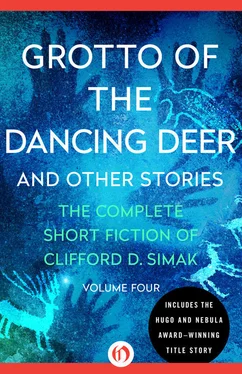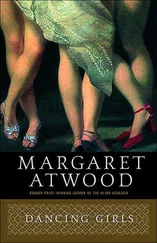Grotto of the Dancing Deer
And Other Stories
The Complete Short Fiction of Clifford D. Simak, Volume Four
Introduction by David W. Wixon
Introduction
The Language of Clifford D. Simak
by David W. Wixon
“The day the barn caved in, Pa was ready to admit flat out that there was something to what Butch’s Pa had said. It was all Ma could do to keep him from going up the road to see Andy Carter and talk to him by hand.”
—Clifford D. Simak, in “No Life of Their Own”
One of the most notable features of the works, and particularly the earliest short stories, of Clifford D. Simak was his frequent use of colloquial language; in fact, sometimes his characters became so “colloquial” as to suggest parody. And such usages were particularly jarring when they came from the mouths of people working in a highly technological environment like outer space (see “Mr. Meek Plays Polo” for one example). To modern ears and eyes, such language appears completely unrealistic. Who would believe that future people would be so primitive, so uneducated?
Some of these usages, I would suggest, were deliberate, exaggerations intended to remind us that the future would still have a place for people with simple lives reflecting simple mores, even if they had to handle complicated technologies. How better to show that the character typically found in down-home, unsophisticated country dwellers would continue to be around in the future?
It should not be thought that such language represented how Simak himself spoke. Keep in mind that he was a teacher for several years before he went into journalism, that he worked in journalism at a high level for more than 45 years, and that he wrote and sold both fiction and nonfiction. (The nonfiction books, as well as the long-running series he created for his newspaper, were of a scientific nature.) And I will attest, from personal experience, that neither Cliff nor his brother spoke in such fashion.
It seems likely that Cliff, during his youth in a rural area of the early twentieth century, knew people who spoke in a rough fashion, and that when portraying similar types he exaggerated their distinctive speech for effect. But that’s all it was: a tool used to make a point in the stories. Clifford Simak had learned not to let an apparent lack of polish, the veneer of a “civilized” lifestyle, mislead him into rejecting the value of those people, their abilities, and their humanity.
So when Bat Ears Brady says (in “Junkyard”) that “‘there’s been planets … I wouldn’t of minded so much being marooned on, but this ain’t one of them. This here place is the tail end of creation’”—don’t let it blind you to the man’s common sense and inherent dignity.
To modern readers, Simak’s use of a variety of now-dated phrases—phrases that might once have been familiar to midwestern Americans, but that have now passed out of common usage—may seem strange.
For example, the expression tin shinny appears in several of Cliff’s early stories. It refers to a hockey-like game boys used to play in the streets using tree branches and a flattened tin can. And although one theory states that the word shinny comes from an old Scottish game, the spirit of the American game—and of Cliff’s use of the phrase—can best be understood if you think of what a sharply struck flattened tin can might do to one’s shins. If you played tin shinny, you knew how to take your lumps and give some back; you could play rough.
The Internet aids modern readers (I count myself one) who find themselves puzzled, even taken aback, when they first run across some of the language Cliff used in his fiction. And although I called myself a “modern reader” a moment ago, I don’t have to resort to my computer to understand the meaning underlying the title of “Party Line.” I’m old enough to have experienced a party line, and to understand that Cliff, in using the phrase, was making an analogy between the situation in the story and the era when rural telephone subscribers often had to share a single (hard-wired, as they say now) telephone line strung out from the nearest small town into the countryside. The consequence: Everyone on that line could, if they wished (and they often did), listen in on the conversations of their neighbors.
And when Cliff refers to “an old whippoorwill chunking up the hollow” (seen in other iterations as “chugging”) in his novel Why Call Them Back from Heaven? , he is simply using now-dated rural speech to describe the sound made by that species of bird calling in the night from somewhere up in the farther reaches of a small valley. (He also utilizes a word that mimics the sound, a literary device occurring in many of his stories.)
Better known, perhaps, is the phrase Dadburn the kid , which Gramp Stevens mutters on the first page of the short story “City.” Cliff specifically pointed at that expression when pulling “City” and its related stories into book form ( City ), painting with some amusement the puzzlement it brought to the doggy historians of the far future, who clearly did not inherit humankind’s extensive stock of mild expletives.
The phrases By Lord! , Thank Lord! , and I be damned! appeared frequently in his earlier stories, but were eventually laid aside. My first, widely separated, readings of those phrases in Cliff’s stories made me think that some typesetter had omitted the words the or will , but once I began to reread a lot of that older fiction over a short span of time, I realized that the same wording came up too many times to be mere mistakes: The phrases popped up the way Cliff wrote them, and perhaps that was the way they were said in the time and place of Cliff’s youth. (I myself grew up with the phrase used to , as in We used to go to the lake, Cliff’s variation of that phrase in “Earth for Inspiration, They never use to come back , irritated me more than I would expect because of that missing D.
Other expressions include Indian sign , which once meant calling down a curse or hex on someone; tying a tin can to someone, which meant firing them from their job; and the frequent references to the word radium in Cliff’s early stories seem to be pre-Atomic Age references to atomic power.
Clifford D. Simak was already a professional newspaperman when he began to write fiction, and that fact explains much of the dialogue found in his earliest stories. For instance, he tended not to use contractions—they were not often used by journalists—which makes his earliest attempts at dialogue seem stilted, at least at some times.
Another reason Cliff’s dialogue was bad in those early days was that he simply had no practice at writing dialogue—you don’t do that in newspapers, usually. So he learned to do dialogue by reading other people’s stories. And back in the 1930s, much of that was dreadful.
But Cliff learned.
David W. Wixon
Over the River and Through the Woods
The great message in the stories of Clifford D. Simak is that simple country people—and equally simple nonhuman beings—can be more understanding, and less afraid, in the face of the strange and the alien than many would think or expect; that the lessons learned in their apparently humdrum lives are as good as most to help them deal with something new. In other words, the value system we know as “common sense” retains its worth in a changing world.
“Over the River and Through the Woods” originally appeared in the May 1965 issue of Amazing Stories , and it’s a sweet reflection of Cliff Simak’s love for his maternal grandmother, Ellen Parker.
Читать дальше












